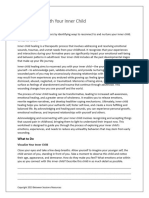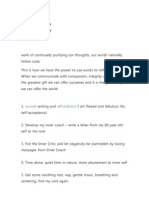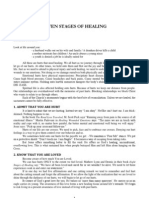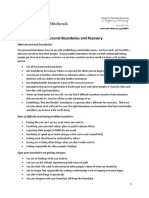Avoiding Toxic Relationships in Recovery
Avoiding Toxic Relationships in Recovery
Uploaded by
melodyfathiCopyright:
Available Formats
Avoiding Toxic Relationships in Recovery
Avoiding Toxic Relationships in Recovery
Uploaded by
melodyfathiOriginal Description:
Original Title
Copyright
Available Formats
Share this document
Did you find this document useful?
Is this content inappropriate?
Copyright:
Available Formats
Avoiding Toxic Relationships in Recovery
Avoiding Toxic Relationships in Recovery
Uploaded by
melodyfathiCopyright:
Available Formats
Avoiding Toxic Relationships in Recovery
Navigating one’s way through intimate relationships can be difficult
regardless of one’s circumstances. Marital and long-term intimate
relationships must go through major reconstruction during recovery or
face collapsing. This reconstruction often involves healing past wounds
to the relationship, redefining role responsibilities, altering daily rituals of
communication, and developing new patterns of sexual intimacy. It also
involves shedding self-defeating patterns of speaking and acting toward
one another that have often become deeply ingrained during the addiction
years.
Here are six principles and prescriptions that might be of help.
1. Individual healing must precede relationship healing. Encourage your
partner to get help for herself or himself via counseling or participation in
groups like Al-Anon or Nar-Anon so that he or she can relearn to trust,
forgive past injuries, and resist the urge to control your recovery efforts.
2. The very thing everyone has been hoping and praying for—
RECOVERY—can threaten an intimate relationship. Because of all the
feelings and patterns of behaviors that developed during the addiction
years, the adjustment to recovery can exert great strain on intimate and
family relationships. Expect such strain. It is a normal part of the
recovery process.
3. Relational healing takes time. Remind yourselves to be patient with
one another through this process. All that is wrong with the relationship
does not reverse itself the moment recovery begins. The relationship must
recover also, and this will proceed, like personal recovery, in ebbs and
flows over time.
4. Relational healing may require outside professional help. Such help
may increase the prospects of successful recovery and the prospects of
salvaging the relationship.
6. Some relationships are not salvageable in recovery. In spite of the best
efforts of those involved, not all intimate relationships will survive the
recovery process. When it is clear a relationship will not survive, find a
way to disengage from the relationship with as little damage to all
involved. This disengagement process may also require outside
professional help.
For those entering recovery not in a committed relationship, there are
the twin pitfalls of getting involved in another relationship too quickly
and getting involved in relationships that are destructive to your personal
health, safety and recovery. These pitfalls can be a particular problem for
those who have come out of a turbulent family background or who have a
history of stormy relationships. The process of selecting intimate partners
is complicated by assortative mating.
Assortative mating is the process through which we select intimate
partners based on similarities or differences with ourselves. This is a
natural process, but can get complicated when we’ve developed a pattern
of picking individuals who mirror our own destructive processes.
Selecting partners that consistently mirror our own problems or abuse
and/or abandon us brings chaos and emotional distress to an already
fragile situation—early recovery. Needless to say, the drama and
disruption of such relationships can undermine the most sincere recovery
efforts.
Here are some suggested guidelines that may be of help.
1. Inventory your past relationships. Are there common patterns to how
these relationships begin and end? Are you drawn to partners that also
have severe alcohol and/or other drug problems? Do you seem to be
drawn to a particular type of partner that ends up hurting you emotionally
or physically? Does it feel like you keep re-enacting the same painful
dramas in your life?
2. Define your pattern of vulnerability in relationships. It is good to get to
know yourself as a person in recovery before getting into new
relationships. Based on the above inventory, complete the following
sentence: I need to avoid getting into relationships with individuals who
_____________________________________________.
3. Define early warning signs. It may be helpful to work with a counselor
or others who have had similar relationship problems.
Warning signs that tell me I want to avoid starting a relationship with
someone.
1. ___________________________________________________
2. ____________________________________________________
3. ____________________________________________________
4. _____________________________________________________
5. _____________________________________________________
Early warning signs that tell me I need to get out of a relationship that has
begun
1. ___________________________________________________
2. ____________________________________________________
3. ____________________________________________________
4. _____________________________________________________
5. _____________________________________________________
4. Consider remaining out of a serious relationship through your early
months of recovery. This is one way to avoid “jumping from the frying
pan into the fire.” Early recovery requires enormous energy. This is a
time requiring a great deal of focus on yourself. If you are not in a serious
relationship, consider this as a “time-out” period to get yourself together.
5. Define what you do want in a relationship. Complete the following
sentence.
What I am seeking in a relationship is a man or woman who has the
following characteristics:
1. ___________________________________________________
2. ____________________________________________________
3. ____________________________________________________
4. _____________________________________________________
5. _____________________________________________________
5. Seek a relationship coach (a counselor, friend or peer in recovery) to
guide you through your first relationships in recovery.
6. If you find your old relationship pattern continuing, get into a long-term
therapy relationship that focuses on breaking this pattern.
7. Assertively manage your own safety and the safety of your children at
all times.
You might also like
- Heart Healing Workbook - Kay NashDocument47 pagesHeart Healing Workbook - Kay NashMrs S. Nembhard-Evans100% (2)
- Shadow Work Embracing The Hidden Aspects of Self For Personal GrowthDocument3 pagesShadow Work Embracing The Hidden Aspects of Self For Personal GrowthAnniey MwangiNo ratings yet
- Essay Erikson: Stages of Development Basic Trust Versus MistrustDocument6 pagesEssay Erikson: Stages of Development Basic Trust Versus MistrustMeags Davis0% (1)
- Assertiveness - Assertiveness Practice WorksheetDocument2 pagesAssertiveness - Assertiveness Practice WorksheetNaachiyaar ANo ratings yet
- Wounded Inner Child Nurtured Inner ChildDocument1 pageWounded Inner Child Nurtured Inner ChildCybertertonNo ratings yet
- Soul TherapyDocument2 pagesSoul Therapytigerlo75100% (1)
- The Marriage PlanDocument2 pagesThe Marriage Planejbaugh100% (2)
- Boundaries PDFDocument2 pagesBoundaries PDFBurcea RobertNo ratings yet
- DocumentDocument219 pagesDocumentmelodyfathi100% (9)
- Berklee Intro Music Therapy PDFDocument17 pagesBerklee Intro Music Therapy PDFTheodore VaillantNo ratings yet
- WK 1 in Video QQsDocument3 pagesWK 1 in Video QQsRoger urbinaNo ratings yet
- Defeat Your Self-Defeating BehaviorDocument39 pagesDefeat Your Self-Defeating Behaviorkwong100% (3)
- Building TrustDocument5 pagesBuilding TrustOmar akbarsNo ratings yet
- Evaluate Your Self-Esteem: Find Your Self-Image Quotient by Answering The Following QuestionsDocument1 pageEvaluate Your Self-Esteem: Find Your Self-Image Quotient by Answering The Following QuestionsNur AdibahNo ratings yet
- Things To Know About AngerDocument16 pagesThings To Know About Angersheelkumar_pal429100% (3)
- Inner Work Self ForgivenessDocument5 pagesInner Work Self ForgivenessSkara C100% (1)
- Life Coaching: Cetificate CourseDocument8 pagesLife Coaching: Cetificate CourseMina Samir DiefNo ratings yet
- Rediscovering WholenessDocument10 pagesRediscovering Wholenessab s100% (1)
- Belief Harmony WorksheetDocument8 pagesBelief Harmony WorksheetAreeba AslamNo ratings yet
- 20 Critical Things You Should Never TolerateDocument3 pages20 Critical Things You Should Never TolerateropesNo ratings yet
- Strengths Discussion QuestionsDocument1 pageStrengths Discussion QuestionsTabassum FNo ratings yet
- Comm 1111 Self-Affirmations Worksheet Online 2020Document4 pagesComm 1111 Self-Affirmations Worksheet Online 2020Natalia StavitskiyNo ratings yet
- Ways To Rediscover Happiness: Find Your DirectionDocument22 pagesWays To Rediscover Happiness: Find Your DirectionEllaine Virayo100% (1)
- Grounding and Self Soothing Techniques PDFDocument2 pagesGrounding and Self Soothing Techniques PDFMArko100% (1)
- Childhood TraumaDocument4 pagesChildhood TraumaMarvellous Munhuwa0% (1)
- Identifying Triggers Worksheet & ExampleDocument10 pagesIdentifying Triggers Worksheet & ExampleДоникаNo ratings yet
- Defining Self WorthDocument2 pagesDefining Self WorthJaime LazoNo ratings yet
- Reconnecting With Your Inner Child - 060723Document9 pagesReconnecting With Your Inner Child - 060723Vesela HadzhiyskaNo ratings yet
- Adult Personal Conflict Style InventoryDocument4 pagesAdult Personal Conflict Style InventoryCarmenNo ratings yet
- 058 - Ds Relationship Design Part 1 - Class HandoutDocument9 pages058 - Ds Relationship Design Part 1 - Class Handoutnouveauxplaisirs100% (1)
- SOC ToolDocument2 pagesSOC ToolazizbekboltaevNo ratings yet
- 30 Days To Self Love Challenge - MKEMBDocument1 page30 Days To Self Love Challenge - MKEMBThea Nguyen100% (2)
- Turning Fear Into SuccessDocument19 pagesTurning Fear Into SuccessMeraki Mary100% (2)
- Healthy Unhealthy Relationship Behaviors ExplainedDocument2 pagesHealthy Unhealthy Relationship Behaviors Explaineddarlene belle100% (1)
- 10 Spiritual Lessons For A BetterDocument4 pages10 Spiritual Lessons For A BetterJessika MontoyaNo ratings yet
- Practice Loving Kindness MeditationDocument3 pagesPractice Loving Kindness MeditationgilbertofitotakuNo ratings yet
- Relationship Roadblocks PDFDocument1 pageRelationship Roadblocks PDFCarlos Reyes100% (1)
- Stress Management WorksheetDocument5 pagesStress Management WorksheetAxel Garcia BritoNo ratings yet
- Dealing With Emotional DetoxificationDocument15 pagesDealing With Emotional DetoxificationEisha Karol100% (1)
- Self Forgiveness in Addiction Recovery WorksheetDocument3 pagesSelf Forgiveness in Addiction Recovery WorksheetJustine ButlerNo ratings yet
- Control Your Anger With Positive AffirmationDocument2 pagesControl Your Anger With Positive AffirmationNhor Halil QuibelNo ratings yet
- Types of Therapy: Type of Therapy Objectives Materials Mechanics of TherapyDocument3 pagesTypes of Therapy: Type of Therapy Objectives Materials Mechanics of TherapyTarquin TomadaNo ratings yet
- Introduction To Secure AttachmentDocument3 pagesIntroduction To Secure AttachmentDea DeaNo ratings yet
- How To Learn To Let Go of What You CanDocument5 pagesHow To Learn To Let Go of What You CanSarinah Urip100% (4)
- What Shadow Are You Contending With BDocument2 pagesWhat Shadow Are You Contending With BmartitarioscribdNo ratings yet
- Understanding Resentment and Bitterness COD WorksheetDocument4 pagesUnderstanding Resentment and Bitterness COD WorksheetshwetaNo ratings yet
- Developing A Growth Mindset Part 1 - AwarenessDocument3 pagesDeveloping A Growth Mindset Part 1 - AwarenessAleksandar DjordjevicNo ratings yet
- Fillable Emotional Mastery and Belief ReprogrammingDocument27 pagesFillable Emotional Mastery and Belief ReprogrammingC P100% (1)
- Practical MindfulnessDocument70 pagesPractical MindfulnessDian RA100% (1)
- Seven Stages of HealingDocument2 pagesSeven Stages of HealingMatthew CoutinhoNo ratings yet
- How To Be YourselfDocument1 pageHow To Be YourselfyuliyamsNo ratings yet
- Building and Maintaining TrustDocument7 pagesBuilding and Maintaining Trustvasugi maniNo ratings yet
- Changing Your Relationship With GamblingDocument32 pagesChanging Your Relationship With GamblingSri HartatiNo ratings yet
- Making Peace With The Wounded Inner ChildDocument3 pagesMaking Peace With The Wounded Inner Childdila pusparini100% (1)
- 8 Self EsteemDocument8 pages8 Self EsteemAndy JikhNo ratings yet
- 7 Days of Gratitude - Free EbookDocument8 pages7 Days of Gratitude - Free EbookPetra PetrišićNo ratings yet
- Enabling - An Overused IdeaDocument4 pagesEnabling - An Overused IdeaThe Center for Motivation and ChangeNo ratings yet
- CommunicationDocument12 pagesCommunicationFanueal Samson0% (1)
- Mastering Your Abundance WorkbookDocument24 pagesMastering Your Abundance WorkbookC PNo ratings yet
- Module 11: Behavioral Activation: ObjectivesDocument6 pagesModule 11: Behavioral Activation: ObjectivesMaria BagourdiNo ratings yet
- Top Tips On Building and Maintaining Healthy Relationships.Document2 pagesTop Tips On Building and Maintaining Healthy Relationships.Alphonce MulwaNo ratings yet
- Self LoveDocument11 pagesSelf LoveJollibee Atienza Gomez100% (1)
- AI and psychDocument3 pagesAI and psychmelodyfathiNo ratings yet
- Activity ScheduleDocument5 pagesActivity SchedulemelodyfathiNo ratings yet
- Roles: in Dysfunctional FamiliesDocument2 pagesRoles: in Dysfunctional FamiliesmelodyfathiNo ratings yet
- TestDocument4 pagesTestmelodyfathiNo ratings yet
- How To RelaxDocument8 pagesHow To RelaxmelodyfathiNo ratings yet
- 2016 07 23 14 40 11Document2 pages2016 07 23 14 40 11melodyfathiNo ratings yet
- Acupuncture A Valuable AdjuDocument7 pagesAcupuncture A Valuable AdjumelodyfathiNo ratings yet
- 4 Gen Holiday TipsDocument2 pages4 Gen Holiday TipsmelodyfathiNo ratings yet
- Greiss Forfeit Money 2020Document18 pagesGreiss Forfeit Money 2020melodyfathiNo ratings yet
- Addiction HandoutDocument9 pagesAddiction HandoutmelodyfathiNo ratings yet
- EvaluationDocument6 pagesEvaluationmelodyfathiNo ratings yet
- Clinical Documentation For Sharing With PCPS: Guidelines For Behavioral Health ProvidersDocument2 pagesClinical Documentation For Sharing With PCPS: Guidelines For Behavioral Health ProvidersmelodyfathiNo ratings yet
- Are Women More Vulnerable To Alcohol's Effects?Document10 pagesAre Women More Vulnerable To Alcohol's Effects?melodyfathiNo ratings yet
- Work Life: 10 Steps To Detect and Stop Secret Self-SabotageDocument4 pagesWork Life: 10 Steps To Detect and Stop Secret Self-SabotagemelodyfathiNo ratings yet
- Primary Prevention 17Document109 pagesPrimary Prevention 17melodyfathiNo ratings yet
- Paws PDFDocument2 pagesPaws PDFmelodyfathiNo ratings yet
- Green Folder: NameDocument33 pagesGreen Folder: NamemelodyfathiNo ratings yet
- Alcoholics AnonymousDocument4 pagesAlcoholics AnonymousmelodyfathiNo ratings yet
- Boundaries and RecoveryDocument2 pagesBoundaries and RecoverymelodyfathiNo ratings yet
- Infacy and Childhood PDFDocument48 pagesInfacy and Childhood PDFmiji_ggNo ratings yet
- ..Document4 pages..Kai PhanNo ratings yet
- Bharadwaja, M., & Tripathi, N. (2020) - Linking Empowering Leadership and Job Attitudes The Role of Psychological EmpowermentDocument18 pagesBharadwaja, M., & Tripathi, N. (2020) - Linking Empowering Leadership and Job Attitudes The Role of Psychological EmpowermentAdis AuraNo ratings yet
- Machiavellian PsychologyDocument14 pagesMachiavellian PsychologyPsycholex100% (9)
- Critchfield, T. S. Et Al. (2018) - Role Model For Pursuing An Expansive Science of Behavior. James G. HollandDocument10 pagesCritchfield, T. S. Et Al. (2018) - Role Model For Pursuing An Expansive Science of Behavior. James G. HollandDiego Mansano FernandesNo ratings yet
- The Effects of Maternal Employment On The Scholastic PerformanceDocument88 pagesThe Effects of Maternal Employment On The Scholastic Performancesln_rjNo ratings yet
- Illness BehaviorsDocument2 pagesIllness BehaviorsJoi Ezra JumamilNo ratings yet
- Psychology of LearningDocument15 pagesPsychology of LearningTutu KhanNo ratings yet
- The Liebowitz Social Anxiety Scale: A Comparison of The Psychometric Properties of Self-Report and Clinician-Administered FormatsDocument11 pagesThe Liebowitz Social Anxiety Scale: A Comparison of The Psychometric Properties of Self-Report and Clinician-Administered FormatsAndreea OniceanuNo ratings yet
- Cyclothymia EnglishDocument10 pagesCyclothymia EnglishDesi Lestari NingsihNo ratings yet
- Sehs 5.3Document7 pagesSehs 5.3Sawar Raj AroraNo ratings yet
- Self-Assessment Library 3.4: Insights Into Your Skills, Interests and AbilitiesDocument4 pagesSelf-Assessment Library 3.4: Insights Into Your Skills, Interests and AbilitiesAlan Osorio Fuentes0% (1)
- Mental Status ExaminationDocument16 pagesMental Status ExaminationConrad C. CatimbangNo ratings yet
- Project 2 - Institutions Analysis The FamilyDocument11 pagesProject 2 - Institutions Analysis The Familyapi-295268811No ratings yet
- Alzheimers POSTDocument23 pagesAlzheimers POSTjohnaaaNo ratings yet
- Job Analysis Is A Systematic ExplorationDocument14 pagesJob Analysis Is A Systematic ExplorationSwati JainNo ratings yet
- Skills Builder Benchmark Aiming HighDocument4 pagesSkills Builder Benchmark Aiming Highjetalal swamikashmirNo ratings yet
- Relationship Psychological Therapy 1Document7 pagesRelationship Psychological Therapy 1Isaac OmwengaNo ratings yet
- The Complete Guide On How To Overcome Your Limiting Beliefs: Goal?Document3 pagesThe Complete Guide On How To Overcome Your Limiting Beliefs: Goal?Beowulf Odin SonNo ratings yet
- 1.1 Does The Cultural Environment Influence Lifespan Development More Than Our Genes?Document4 pages1.1 Does The Cultural Environment Influence Lifespan Development More Than Our Genes?Savannah Simone PetrachenkoNo ratings yet
- "Organizational Behaviour Self-Assessment Exercises" PDFDocument2 pages"Organizational Behaviour Self-Assessment Exercises" PDFChrise5502No ratings yet
- Rezumat Engleza PDFDocument58 pagesRezumat Engleza PDFCera Monika100% (1)
- The Soloist 2Document7 pagesThe Soloist 2api-710115585No ratings yet
- (Koppitz) Psychological Evaluation of Children's HumanDocument352 pages(Koppitz) Psychological Evaluation of Children's HumanrnhyNo ratings yet
- Criminal SociologyDocument66 pagesCriminal SociologySal McGaundieNo ratings yet
- IQ Test. No Obligations, Free Online IQ Test atDocument1 pageIQ Test. No Obligations, Free Online IQ Test ateadarasaisamhitaNo ratings yet
- Big Five InventoryDocument3 pagesBig Five InventoryAlina Dănescu100% (1)













































































































